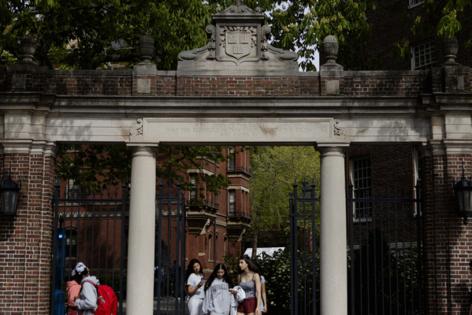Harvard $2 billion funding freeze found illegal by US judge
Published in News & Features
Harvard University scored a major legal victory in its battle with the Trump administration after a court ruled that the U.S. illegally froze more than $2 billion in research funding.
The U.S. government violated Harvard’s free speech rights and didn’t follow proper procedures when it suspended a wide range of research grants in April, according to a federal judge. The ruling paves the way for the funding to be released to the school, although the administration can still appeal.
Harvard has been the main target of President Donald Trump’s efforts to reshape elite higher education, a campaign that started by accusing schools of fostering antisemitism, but it’s grown into a much broader attack on diversity programs and perceived political bias. The administration said it was withholding federal funding because the school failed to protect Jewish students on campus following the start of the Israel-Hamas war, among other issues.
In her ruling, U.S. District Judge Allison Burroughs said the Trump administration violated Harvard’s free-speech protections as well as U.S. civil rights and administrative laws.
The Trump administration “used antisemitism as a smokescreen for a targeted, ideologically-motivated assault on this country’s premier universities, and did so in a way that runs afoul” of the the law, Burroughs wrote in an 84-page opinion. She issued the ruling as a so-called summary judgment after deciding a trial was unnecessary.
Although the ruling is a win for Harvard and its president Alan Garber, the school’s broader clash with the administration continues. The government has also threatened Harvard’s tax-exempt status and attempted to halt international student enrollment.
Settlement talks
Trump has said he wants “nothing less than $500 million” from Harvard in any potential settlement of the litigation. Several other schools have settled rather than fight in court, including Columbia University, which agreed to pay $221 million.
As part of a separate lawsuit, Burroughs temporarily paused the government’s efforts to bar enrollment of international students and prevent them from entering the U.S. to study at the college.
The ruling comes as students return to campus for the fall semester.
Harvard has warned that the combined cost of federal actions against the school, including a recently passed tax increase on its endowment, could reach $1 billion a year. A letter sent by Garber and other leaders said each school and unit will cut expenditures, and a hiring freeze will remain in place.
Lawyers for the university have argued that the U.S. violated the school’s First Amendment rights by demanding it cede control and make specific changes in order to continue receiving money from the government.
In a July hearing, the school urged the judge to overturn the freeze order, calling the administration’s decision “arbitrary and capricious.” They also claimed the U.S. didn’t follow the proper procedures when suddenly halting the funding, violating the procedural limits of Title VI of the Civil Rights Act of 1964.
Civil rights
The administration insisted it was protecting students’ civil rights, and called taxpayer funds a privilege to be earned. Lawyers for the administration said the U.S. was allowed to cut off funding if Harvard is “no longer aligned with” government priorities.
At the hearing, Burroughs said it was “a little bit mind-boggling” for the U.S. to argue that the government can terminate contracts if it disagreed with viewpoints unrelated to the subject of the grants. But Justice Department lawyers said the U.S. can end contracts “for any policy reasons.”
The case is President and Fellows of Harvard College v. U.S. Department of Health and Human Services, 25-cv-11048, U.S. District Court, District of Massachusetts (Boston).
_____
(With assistance from Janet Lorin, Anthony Lin, Pierre Paulden and Peter Blumberg.)
_____
©2025 Bloomberg L.P. Visit bloomberg.com. Distributed by Tribune Content Agency, LLC.







Comments